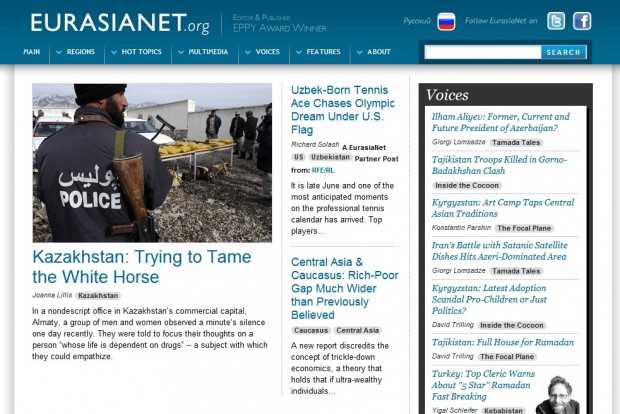Central Asia & Caucasus : Rich-Poor Gap Much Wider than Previously Believed
Major News in <Urasianet.org> : Rich-Poor Gap Much Wider than Previously Believed
A new report discredits the concept of trickle-down economics, a theory that holds that if ultra-wealthy individuals receive tax breaks and other incentives, they will drive economic growth and promote prosperity for all. Instead of spreading the wealth, the global rich tend to sock their money away in off-shore tax havens, the study suggests.
The report, titled The Price of Offshore Revisited, was prepared by a non-profit watchdog group, the Tax Justice Network (TJN). It estimates that the super-rich around the world have between $21 trillion and $32 trillion stashed away in tax havens.
Among the top 20 countries for super-wealthy tax dodgers is Kazakhstan, with an estimated $138 billion in individual assets, or more than four times the country’s estimated state revenue in 2012, deposited in off-shore accounts. Among other former Soviet states, Russian citizens have an estimated $798 billion hidden off-shore, while Ukrainians and Azerbaijanis have ferreted away $167 billion and $48 billion respectively.
The amount of cash sitting in off-shore accounts appears to be much higher than TJN researchers had anticipated. The lead researcher for the report, James Henry, characterized the off-shore system as a financial “black hole” that deprives governments of much-needed tax revenue. The data also indicates that the gap between rich and poor is far wider than previously believed. Studies of income inequality undertaken to date have tended not to take into account so-called hidden assets, especially off-shore accounts.
“This off-shore sector is large enough to make a significant difference to all of our conventional measures of inequality,” Henry said in a written statement distributed by TJN. “Since most missing financial wealth belongs to a tiny elite, the impact is staggering. For most countries, global financial inequality is not only much greater than we suspected, but it has been growing much faster.”
Many countries are debtor states on paper, but if off-shore assets were taken into account, these countries would be in the black, the TJN report suggests.
“Given all this, it is scandalous that official institutions like the Bank for International Settlements, the International Monetary Fund, the World Bank, the Organization for Economic Co-operation and Development and the G20, as well as leading central banks, have devoted so little research to this [off-shore] sector,” Henry said.
In compiling the report, Henry drew on data from leading international institutions, including the IMF and World Bank, as well as statistics compiled by treasuries and central banks around the globe. According to the TJN statement, Henry triangulated his figures “against data reflecting demand for reserve currency and gold, and data on off-shore private banking studies by consulting firms and others.” The TJN study measures only cash assets held off-shore. It does not gauge the value of off-shore real estate and luxury goods, including yachts, cars and art.
Among countries in the Caucasus and Central Asia, Kazakhstan and Azerbaijan were the clear leaders in terms of the overall amount of cash held in off-shore accounts. Citizens of Uzbekistan lagged far behind with $23 billion in off-shore holdings, the TJN study estimated. Energy-rich Turkmenistan had a mere $3.4 billion harbored off-shore, not much more than Tajikistan at $2.4 billion. Kyrgyz citizens had just under $1 billion hidden in tax havens. Meanwhile, Georgians have stashed away an estimated $4.1 billion, and Armenians $2.2 billion.
TJN is independent non-profit organization, launched in 2003 under the auspices of Britain’s houses of parliament. Among its most prominent funders in 2011 was the Norwegian Aid Agency.













































